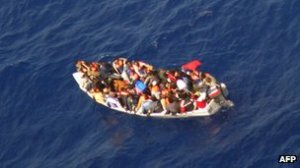 The report by the Council of Europe’s Special Rapporteur Lives lost in the Mediterranean Sea: who is responsible? Is now available to download from the COE website.
The report by the Council of Europe’s Special Rapporteur Lives lost in the Mediterranean Sea: who is responsible? Is now available to download from the COE website.
1500 migrant deaths in 2011
The report starts by noting that a shocking 1500 migrants are known to have lost their lives crossing the Mediterranean in 2011 alone, but focuses on the tragic event in March 2011 which led to the death of 63 out of the 72 migrant passengers. In summary, a ship left Tripoli in Libya, it was at sea for 2 weeks during which no one came to the aid of the boat despite the logging of a distress call, and despite coming into contact with other vessels. It drifted back to Libya with only 9 survivors on board.
A Catalogue of failures
The report lists a catalogue of failures which meant that opportunities to save 63 lives were lost. The report identifies the following:
- the Libyan authorities failed to maintain responsibility for their Search and Rescue zone
- the Italian and Maltese Maritime Rescue Coordination Centres failed to launch any search and rescue operation
- NATO failed to react to the distress calls, even though there were military vessels under its control in the boat’s vicinity when the distress call was sent including one that was estimated to have been 11 miles away
- the flag States of vessels close to the boat also failed to rescue the people in distress.
- two unidentified commercial fishing vessels also failed to respond to the direct calls for assistance from the boat in distress.
- gaps in the maritime legal framework and a failure by NATO and the individual States militarily
- involved in Libya to anticipate adequately for an exodus of asylum seekers and refugees- in particular the alleged failure of the helicopter and the naval vessel to go to the aid of the boat in distress, regardless of whether these were under national command or the command of NATO.
Recommendations
The report goes on to make a series of recommendations. The recommendations will be debated in April in a plenary session of the Parliamentary Assembly, probably on Tuesday 24 April. In summary the report’s recommendations for change include:
- a possible amendment of international law with a view to ensuring that that the vacuum for responsibility for a Search and Rescue zone is plugged where a state (in this case Libya) cannot/does not exercise its responsibilities for search and rescue
- the development of clear and simple guidelines about what amounts to a distress signal – this would avoid confusion about when obligations to launch search and rescue operations apply
- the need to develop a common understanding that a ‘vessel in distress’ is one which safety requires that the vessel is assisted
- tackling the reasons that commercial vehicles fail to go to the rescue of boats in distress through dealing with economic consequences for rescue, fear of criminalisation, and legislation to criminalise private shipmasters who fail to comply with obligations under the law of the sea, and harmonisation of maritime law
- ensuring as per the Hirsi judgment in the ECtHR people are not pushed back to countries at which there is a risk of violation of Article 3 ECHR
- addressing the issue of asylum burden sharing given problems frontline state face
- improving identity and data collection sharing in order to respect the rights of families’ to know the fate of those who lost their lives
- ensuring that the lack of communication between NATO and Maritime Coordination Centres is addressed through introduction of a mechanism t coordinate assets in Search and Rescue Zones
NATO enquiry
The report also recommends that:
- NATO provides a comprehensive response to outstanding requests for further information on the involvement of other vehicles
- NATO conducts an enquiry into the incident
- NATO takes into account in its operations possible refugee movements and reaches agreement with other countries to ensure that refugees are protected
- National parliaments launch investigations into responsibility of their countries
Leave a comment